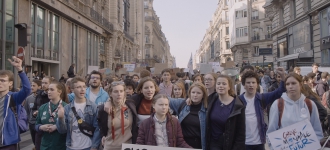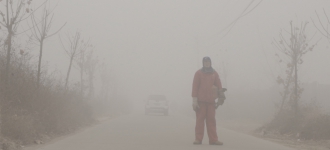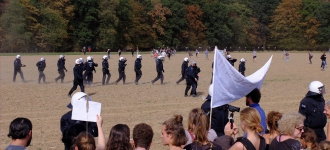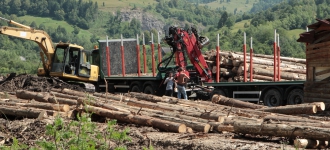
Has the pandemic overshadowed the green movement? Have we lost focus of one of the most acute issues of our time, or have we just softened our tones?
The films in this year’s Anthropocene section examine specific issues that rationally point to the very core of these problems and their solutions — no small talk or relativized justice, just investigative activists, identifiable responsibility, traceable facts and well-articulated expectations. If we only accomplished as much for our environment as these documentarians have managed, the ecosystem of the Earth would be headed in the right direction at astonishing speed.
I am Greta is a classic documentary and a must-see this year. The director has a genuine flair for presenting the life and activism of Greta Thunberg, as well as the ever-increasing media attention that universalizes not only Greta’s life, but the film’s message as well.
Wood starts mysteriously, somewhere in the East, in a far-away forest that is hidden from the mass media, where corrupt and illegal logging can be carried out. Bribed forest managers and paid-off loggers work for unknown “investors”. With the aid of hidden cameras, investigative journalists and legal experts play their part in decisively uncovering the capitalist clients.
Is it possible to make anything delicious out of acorns, moss and weeds? The protagonist of the Korean documentary, The Wandering Chef, cooks entirely from foraged food. He prepares food for the elderly, and at the film’s crescendo, makes a 108-course funeral feast.
Smog Town displays the struggles of a civil servant and his assistant as they venture to put an end to the massive industrial pollution in their town, just 40 kilometers outside of Beijing. Together they try to find a balance between centralized, totalitarian red tape and the interest of the locals, no easy task as the steel factory employs much of the town. Their everyday battles are documented from their weekend lunches to their encounters with power.
The Red Line - Resistance in Hambach Forest exhibits how the modern German economy holds up against some of society’s more extreme members. Local activists take to squatting in treehouses to protect the Hambach Forest, while capitalists align with politicians in a bid to destroy what has become their home in order to excavate lignite. Support for the protestors grows, however, and a series of demonstrations are organized in solidarity with the activists.
Mária Takács
Program curator






